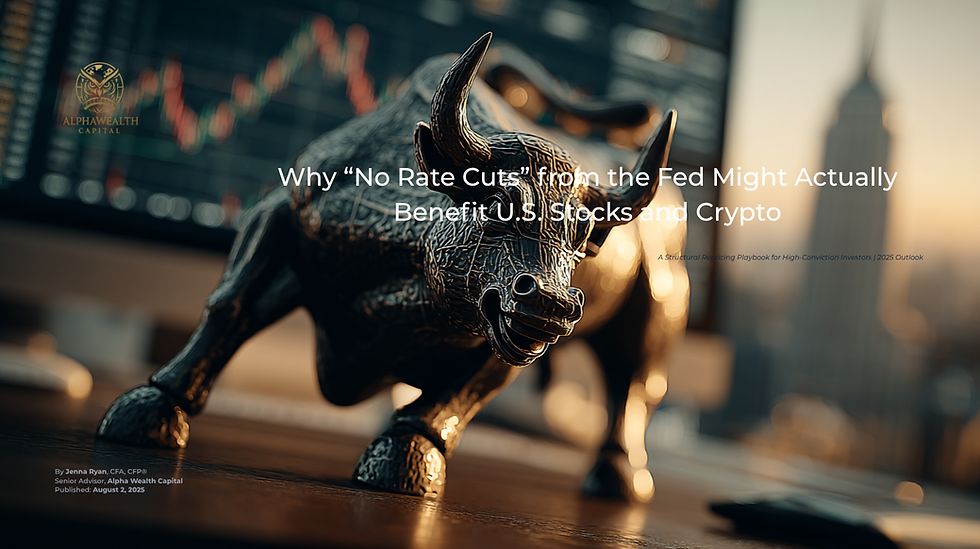Why 90% of High-Net-Worth Individuals Miss the Best Investment Opportunities
- Jenna Ryan
- Jun 13, 2025
- 3 min read
📌 Executive Summary

The Uncomfortable RealityDespite having substantial wealth and sophisticated financial advisors, 90% of high-net-worth individuals consistently miss the most lucrative investment opportunities of their generation.While they achieve respectable 8–12% annual returns, a select few are capturing 25–40% returns—and sometimes more—through Pre-IPO investments.

The Opportunity Gap💭 If you had invested $100,000 in Tesla's pre-IPO round in 2009, your investment would be worth over $1 million today.The same amount in the S&P 500? Roughly $350,000.
This isn’t luck. It’s access.
The Information DivideThe difference isn’t intelligence or risk tolerance—It’s access to private markets, historically reserved for institutions and ultra-high-net-worth families.
The SolutionThis handbook reveals:
Why traditional investing is limited
How Pre-IPO investing builds superior wealth
And how you can now access these previously exclusive deals via platforms like Alpha Capital Wealth
🧠 Key Findings
✅ Public investors capture only 20–30% of a company’s total value✅ Pre-IPO investors in successful companies often earn 5–10x more✅ The private market is now $3T+, but still largely gated✅ New tech + regulation = democratized access✅ Accredited investors with $100K+ can now enter deals that once required $10M+ minimums
📘 Chapter 1: The Hidden Truth About Traditional Investing
The Illusion of Market Efficiency
We've been told public markets are efficient.That’s created a blind spot: investors remain trapped in a cycle of mediocre returns.

The 8–12% Ceiling
Traditional portfolios—mutual funds, ETFs, even hedge funds—typically yield 8–12% annually.For a $1M portfolio, that's $80K–$120K/year.Respectable, but not transformational.
Meanwhile, Pre-IPO returns of 25–40% are not rare—they’re expected.The difference? Timing and access.
The Public Market Trap
Problem #1: You're Always Late to the PartyBy the time a company goes public:
Founders got shares at pennies
VCs bought in at $1–$10
Pre-IPO rounds priced at $20–$50
IPO priced at $100+
You enter at $150+
Most value creation is already captured.
Problem #2: Information AsymmetryEven in public markets, you’re behind:
📉 Quarterly reports ≠ real-time conditions
🧾 Filings are legal docs, not strategy
🧠 Analysts are biased, not visionary
📺 Media noise clouds real signals
Problem #3: Market Volatility = Emotional Traps
🧠 Panic selling in downturns
🚀 FOMO buying in bull runs
🔁 Chasing trends, ignoring fundamentals
🐑 Herd mentality leads to buying high, selling low
The Diversification Myth
The False Comfort of 60/30/10Wealth managers suggest 60% stocks, 30% bonds, 10% alternatives.It reduces volatility—but also caps growth.
True diversification means exposure to different stages, not just different sectors.
Correlation Crisis2008 & 2020 proved: in crisis, everything drops together.Pre-IPO assets aren’t subject to daily price swings—They offer true non-correlation.
The Hidden Costs of "Safe" Investing
The Fee DragTraditional investing = high, compounding costs:
1–2% management fees
10–20% performance fees
Trading friction + short-term taxOver time, these costs shrink your returns by 30–40%
Why Institutions Always Win
Institutions allocate 20–40% to private markets:
Private equity
Venture capital
Private credit
Real assets
Meanwhile, most individual portfolios have 0% private exposure.
The Opportunity Cost
While you’re earning 8–12%, here’s what others earned:
Tesla Pre-IPO (2009–): 1,000%+
Uber (2011–2019): 800%+
Airbnb (2008–2020): 600%+
SpaceX (2012–): 2,000%+ (and still private)
These aren’t lucky bets. They’re structured, de-risked investments.
The Mindset Shift
From Risk Avoidance → Risk ManagementTraditional advisors teach you to fear risk.But intelligent risk = opportunity.
Pre-IPO investing isn’t “riskier”—it’s differently risky, and manageable.
From Passive → ActiveIndex funds are passive.Private investing is intentional:
You evaluate real companies
You understand growth catalysts
You choose conviction
🧾 The Bottom Line
Traditional investing was built for an old world:Limited info, high friction, zero access.
The new world gives you the same opportunities once reserved for billion-dollar funds.
The only question is:
Can you afford not to participate?
👉 This Is Just the Beginning
The real wealth advantage lies in what happensbefore the headlines — before the IPO.
📲 Follow us at @AWCapitalX🔓 Unlock the strategies the top 1% are quietly using to stay ahead.



Comments